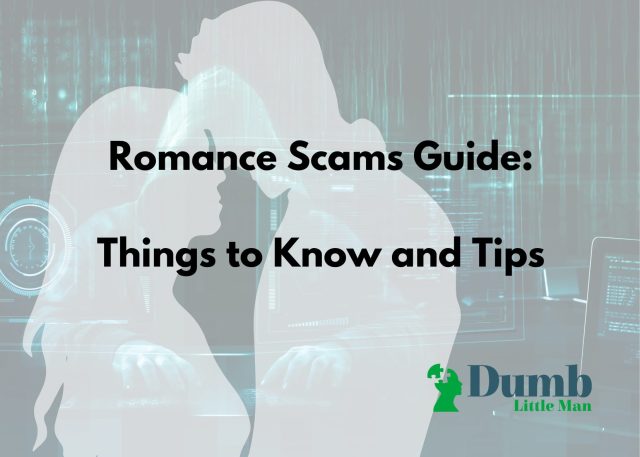Romance Scams Guide: Things to Know and Tips in 2024
By Ruth Jesse
January 10, 2024 • Fact checked by Dumb Little Man

Online dating is fast increasing in popularity. And really, nothing suggests a downslide anytime soon. Fraud reports show that online dating subscribers in the US increased from about 28.9 million to 49 million in 2021. There are projections that the figure will hit 50.9 million by the end of this year. There are chances you also know someone that found their soulmate on a dating website. However, following the growth also is an alarming increase of scams.
In most cases, scammers put up fake profiles fake affections to get to play on people’s emotional triggers. Besides, several users are desperate mid-lifers who will do just anything to find a partner. They wouldn’t mind sending money and buying expensive gifts to get what they want. Only for you to find out after a few months that they are up to no good.
If you’ve had a share of this or you know someone who has, there are chances you’ll think online dating apps and websites are nothing less a marketplace for scammers. Well, I understand your concerns and feelings. However, there are many sincere singles hoping to find love someday on those platforms. Usually, those that fall victim to scammers are not always quick to spot red flags. If this sounds like you, then this guide will be helpful. This article will take you through everything you need to know and do to have a successful online dating experience. Let’s get started.

Romance Scams Guide: How Romance Scams Work
Scammers know most online dating subscribers are in for business. Thus, scammers make their profiles inviting with information that you almost can’t ignore. Some would go as far as using a fake profile picture and lie about what they do. They often stage as CEOs, staff of multinational companies, military officers, and even big-time health workers.
Next, they chat you up, pretending to be “single and searching,” ready for a serious relationship, or even propose marriage. So you won’t spot a thing. They take a while to tickle your emotions and build a good rapport. Once they see you’re basking in the aura romance, they get to work and start tricking you into sending money. Here are some common tricks scammers use to lure people online.
Quick Takeaways about Dating Scams

Scammers create accounts on dating platforms – websites, dating apps, like every other subscriber, and complete their profiles with highly captivating information to impress their victims. In most cases, they use pictures of gorgeous women. Afterward, start a chat posing to be sincere. Going a step after the other, they build intimacy, subtly begin to play on victims’ emotions to hook their affection. With time, the victims lose their guard and start falling for the scammers’ tricks.
Since dating sites are the most accessible place to find sincere singles, scammers start the game there. However, there are instances when they hunt for dupes on social media platforms like Facebook, Instagram, and Twitter. With the search filter, they can reach their targets easily. To leave no end loose, they make up names. This way, you can’t trace them after they execute their evil plans.
Dating scammers are smart enough to build good rapport first. Once everywhere looks green, they move to get the “love life” out of the online dating website. Usually, they suggest you port to social media platforms, emails, and phone communication. While the victim is ignorantly saying, “Oh great, he’s getting committed,” the scammer is laughing his ass out, yelling, “Perfect, I’m a step away from making another big catch.” This s just the beginning of adventures.
As you would expect, their location on those platforms would be the United Kingdom, United States, Australia, or any other Western country. Besides, you’re not likely to look their side if they had put their real country. They are aware of this and give you exactly what you want.
Scammers would only start making requests when the emotional torrents are high. At that time, the “emotional bond” is through to the roof. And that is not so difficult to know. The victims already believe them to be trustworthy folks who mean good for them. Every scammer is eager to push the game to this stage. They cook up stories of financial hardships, emergencies that are almost impossible to doubt. Sometimes, online dating scams come as requests for gifts and personal details like credit cards and bank account portfolios. You are best of friends already, so, chances are you won’t think of hesitating. You’ll want to come through for your them.
Every year, the value of money lost into online dating scams keeps increasing. Between 2016 and 2020 alone, online dating users have been duped an estimated sum of 813 million dollars. Mind you, those are just the reported losses alone. Sadly, victims can do little or nothing to recover their monies since the culprits are anonymous.
What To Search Out For In Romance Scams and How To Avoid Them

Yeah, we’ve said a few things about how romance scams work. Now let’s hit the nail on the head to figure out what to search for in romance scams and simple ways to avoid them.
Romance scams follow the same pattern as an online businesses. As you know, businesses that leverage online presence will go any length to get prospective buyers’ attention. They put forth hook statements that appeal to their emotions (the buyers). Scammers know what online dating subscribers need – a successful and handsome man with whom they share a common interest. As you know, intimacy grows much faster and stronger when partners share a lot in common. Say, career, business, religious belief, or even sports.
From statistics, divorced mid-lifers and widows are often the ideal targets of online scammers. For several reasons, they have slim chances of finding their picture-perfect within their age groups around. Also, most of them know little or nothing about cyberbullying and online scams. Their innocent minds yell, “The world is tech-driven, so I have to be smart.” And since many of them are not conversant with tech innovations, they fall for tricks easily. As a rule, the more tech-savvy you are, the less the chances of falling victim to scams.
They tickle and fonder the victim’s emotions long enough to build “mutual affection” and trust. As smart guys, they don’t start with a big hit. They go a step at a time. Often, they start with simple requests for money to attend to minor issues like fixing their car. As someone that is well-to-do, the chances are slim for the victim to spot any ulterior motive.
Afterward, they take a break from making requests and play with the victim’s emotional triggers a bit more intensely. Even if you’re super-alert on a norm, this is enough to distract you. They wait till there are sure signs the victims are ready for full commitment. Once things get more interesting, the scammer may ask the victim for personal details like bank details or suggestive videos and photos. In most cases, scammers’ targets are to get their victims to send them nude pictures and videos, especially when they know they are affluent or in a promising relationship. Once they are in possession of those compromising media files, they may threaten a leak. A Victim who prioritizes her dignity and reputation would do anything to play safely. Sometimes, if the victim is a public figure, snapshots of past compromising chats might also serve as exhibits.
This is the most rewarding part of the scam and often the beginning of adventures. Scammers would ask their victims to send money. And this time, not the usual crumbs for fixing a faulty vehicle. This time, they ask for pretty large amounts. Sometimes, they get victims to carry out illegal activities. There’s a limit to how defensive victims can be since a third party has their secret. Even if there’s no blackmail in the game, the victim is already obsessed and would do anything to keep the relationship going.
The scam goes on till the victim is bold to dare the risk. They are often shy to report to law enforcement agencies or share with a third party. I could remember my friend Michelle’s romance scam experience. Even though she knew she was being scammed and her money was fast going down the drain, she hid it from everyone. Not until I bumped on her chat with the culprit who started as a “would-be suitor.” Wickedly, scammers take advantage of this as long as they can. Trust me, you don’t want this.
So, how do you avoid being scammed? The red flags to search out for
Most online dating enthusiasts think they are smart, and no trick on earth would work on them. Well, all those who have been scammed said the same thing. As we said earlier, scammers take their time to fonder your emotional triggers, and they are becoming more creative with their tricks these days. Instead of doing hit-and-miss with your hard-earned money with online dating, you can learn how to spot red flags.
If you want to try out finding love online, below are some tricks to watch out for.
⫸ “Trusted” profiles

A scammer knows his first opportunity to impress a victim is via his profile. And most times, the first impression is often the only impression. So what are the red flags to watch for in fake online profiles? The first is the “About me” section. Basically, the “about me” segment introduces a person to you before discussing with them. It’s a terrible indicator when someone purposely ignores that piece. Look, when a person searches for a spouse on a dating app, they usually spend their time appearing decent to potential matches.
Secondly, check the profile picture. Scammers usually have killer photos. I’m sure you know what I mean. Besides, you are not likely to look at their side if their display picture isn’t captivating. However, a few use blur and inappropriate photos with little information about them. You and I know someone who is an online dating site user and has a smartphone that will snap pictures. If they only provide two outdated or blurry images and are hesitant to offer more when you ask them, there could be something fishing.
That said, nine of ten scammers use extremely attractive or seductive images and even pose to be military officials or medical practitioners. Those are professions that tickle. It is also worth noting that many fraudsters work in small groups yet present themselves as a single person.
Be on edge for adjustments in languages, emojis, and attitudes. However, you may need a pretty long time to figure this out. So, pay attention to these tiny details to avoid wasting your time or risk getting scammed. Be on the watch for profiles with stolen images.
⫸ They hook you with some common interests

Most scammers already know how this online dating site matches people. Thus, they get really tactical about it. Usually, they study the person they want to defraud and go the length of tailoring their profile to suit the spec of their targets.
They will often pick up essential details on your profile and add them to theirs. They could even study the kind of things you like, like your hobbies, places you have been to, the football club you support, your favorite artiste, or even your career and religion. Those are fertile grounds to plant intimacy. Social media sites make that pretty easy. All they need is to search for your name on a social media site and review your past activities and profile.
We all love to share what we are up to on those platforms. Once they have gotten sufficient information about you, chatting with you becomes easy. Those details become their idea to hook you. They will lie that they have been to your favorite places. Some would even go as far as saying they do the same business as you.
Next, they send a friend request. In the middle of your conversation, you will think you have finally met someone that perfectly understands you. Hell no, darling. Before you know it, you are already disclosing personal information about yourself.
So, after meeting them, it is necessary to check more about them on other social networks. However, most scammers do not have an online presence. If you cannot find anything helpful about that person online, that is the best time to ask questions. There are chances he is a scammer. Thus, don’t be in a hurry to say “I do” when you have not confirmed someone’s identity.
| RECOMMENDED HOOKUP SITE | REVIEW | VISIT |
|---|---|---|
 | #1 hookup site with large member base! In business for 20 years! Free to Try! |  |
⫸ They become overly emotional very quickly

Scammers do not have much time to spend on a person as they have multiple targets. Besides, they are on other platforms where they wreak havoc. Generally, they love to make quick moves instead of taking things slowly. In other instances, you may begin to notice them showing you too much affection and acting sweet. If you don’t get frequent messages, you will receive many calls. While this can seem awkward, some people will fall easily for it.
Now imagine you met someone online today, and the next day the person is acting too sweet, sending love messages, giving you more attention, and blowing your minds with sweet words. If you receive this treatment, this is enough reason to suspect a scam. It is too much of a coincidence for you to meet someone online, and suddenly, he is over you.
Thus, be wary of strange people who send romantic texts, send poems, or a series of love messages. I know how sweet it is to blush reading romantic love messages. However, it can be a prominent red flag. You can’t meet someone today, and the next day you start bombarding that person with love messages. Real online dating grows in stages. So, anytime you notice a new friend suddenly starts to act too sweet or is trying to make fast moves, take caution, so you don’t fall for their scheme.
Another simple check is copying and pasting any love message you receive on Google Search. Knowing whether a person wrote it himself or copied them online can be helpful to know what they are up to. Look out for anyone who is always calling and showing too much affection. Scammers are likely to ask you for your cell phone number to message you on a direct messaging app like WhatsApp instead of waiting till you know each other properly.
⫸ Asking for money
An online scammer will undoubtedly ask for money from you. They are usually very tactical with this. But mostly, they lie about medical issues, family challenges, and travel challenges. To hook you, they may cook up stories that their banker just placed a ban on their account, and they have to send money to a dying family member.
Cunning scammers may even mislead you into giving them money by pretending to ship you a gift that demands import duties. Furthermore, fraudsters usually don’t operate alone. You can get a call or papers from somebody acting as a third party, asking for money. For your safety, do not share your financial details with anyone.
If you receive any demands for money from a person, you have not met, especially someone you encountered online. It is wise not to rush making the payment. First, talk to a lawyer, family members, or a friend about it. It doesn’t matter how long you have been communicating with a person online, do not trust anyone you meet online.
⫸ Asking for suspicious activities
Beware of anybody asking you to send a package or pick up any packages for them. Most fraudsters usually request their lovers to help them ship something out of the country. Scammers are likely to ask you to send a code you receive on your phone. If you receive any message concerning cryptocurrencies, grants, or some investment scheme, stay away or report that person.
In addition, be cautious of any request to sponsor a charity event and lotteries. Some scammers go as far as creating a website for a lottery program or charity event. If you encounter something like this, research the event they ask you to sponsor. It is one of the sure warning signs. Check the website properly, evaluate its authenticity
⫸ Introducing you to relatives, business partners, etc.
Imagine meeting someone on a dating website, and after three days, they are telling you about their family or trying to introduce you to their siblings. I know it may sound sweet, and it may seem like you have found your treasure. Be cautious! Scammers usually work in groups, and they pretend to act like relatives.
Another popular route scammers often plow is introducing victims to co-scammers who impersonate bank managers, lawyers, military personnel, travel agents, and more. They may further ask you to invest in a project their business partners are into, and they will try to convince you that you will make a fortune if you invest with them.
If you get this kind of information from a person you met in a dating app, this is one of the warning signs. Report, or block them instantly.
⫸ Making broken promises
Scammers are good at crafting lies and making excuses. Some may ask you to make a quick transfer to someone and promise to refund it soon. But in the end, you’ll receive nothing from them. They will extort more money from you before realizing they are scamming you.
One of the popular promises online scammers make is planning to meet up with you and, in the end, not showing up. Scammers never keep up with their promises. At the last minute, they always have a well-crafted lie. They could tell you that something unexpected happened or even lie that they had a medical emergency. Scammers will never meet up with you because they pretend to be somebody else. Some will pretend to be military personnel and make excuses of being called for fieldwork, or they got an international job. The deal breaker is that scammers will never meet up with you, so beware of them.
FAQ about Romance Scams
∎ What are the common online platforms where scams take place?
Scammers are on every online platform you can think of, from social media sites to emails. So long as a platform supports instant messaging, it is a potential hideout for scammers. However, scams tend to be more prominent on Google Hangouts, Facebook, Instagram, LinkedIn, and Tinder. That said, communication often starts from dating websites till the relationship hits a significant level of intimacy.
∎ Which common countries do romance scammers operate from?
As you probably know, most scammers lie about their location. They only put the United States, Australia, the United Kingdom to hook attention. While they can operate from anywhere in the world, most scams are from culprits residing in Nigeria, Ghana, Russia, Ukraine, and Malaysia. Thus, you may need to double your guard when someone from those countries starts hunting you.
∎ What are common tactics used by scammers?
Most scammers plow the routes of cooking lies to win your compassion. If they are not dealing with an emergency case, they will be in a thick financial hardship. They could make a direct request for financial assistance or ask you to patronize their business if they are staging to be businessmen. There have been records of scammers claiming to be high-class professionals, military personnel, renowned business people, oil rig workers. Four out of five scammers on online dating websites will say just that. However, don’t hesitate to do a background search if you suspect any funny move. Scammers are becoming more creative these days.
∎ What can I do to protect myself in 2024?
To protect yourself from online romance scams, avoid acting too fast. If someone says they like you, take your time to do thorough background research. Check up their mails, social media handles, and phone numbers. Do the names on those platforms match? Check the past activities on those handles. Are there any discrepancies? As for the phone number, you can use an identity-revealing app like “Truecaller.” You must take the background search a step at a time so you can screen every detail properly. However, we recommend that you report scams promptly if any eventually occurs.
Conclusion
As thrilling as it could to be in an online relationship, you need to be careful so you don’t fall victim to scammers. We’ve identified the red flags to watch out for and what you can do to protect yourself. A scammer might use another person’s photo and track you on a social media platform. Many victims have reported the game started with an unexpected friend request. Before you render any financial help to a friend, wait till you meet in person. Don’t hurry to tag anyone as a “prospective partner.”
Ruth Jesse
Ruth is a life coach who specialises in relationships and career development. Outside work, she loves writing novels and guides for personal development.





